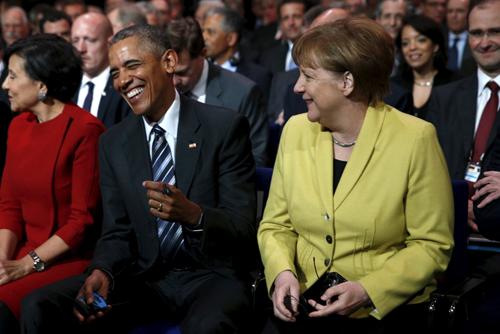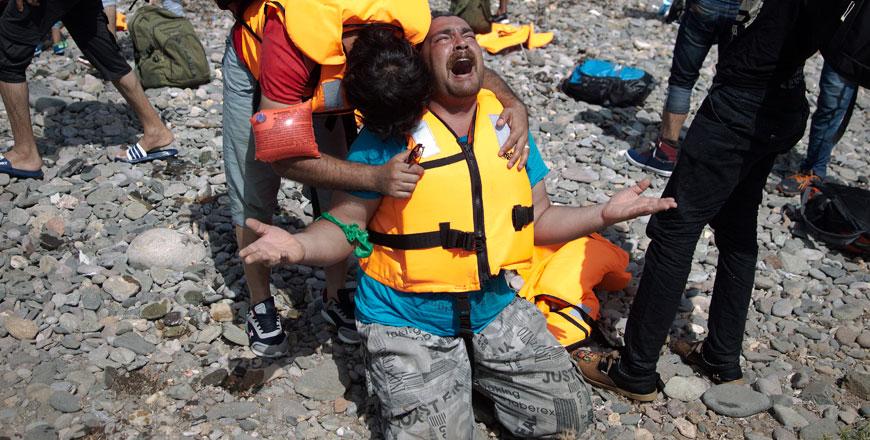You are here
Follow the leader? Germany struggles as Syria, refugee crises rage
By Reuters - Feb 14,2016 - Last updated at Feb 14,2016
MUNICH — Germany, Europe's reluctant hegemon, is trying its best to lead in the face of multiple overlapping crises, but no one is following.
That was a central message from this year's Munich Security Conference, an annual event where leaders and diplomats from Europe, the Middle East and the United States gather to debate the world's problems.
It ended on Sunday on a far gloomier note than it started — with doubts being cast over a fledgling truce plan for Syria, with Russia defiant and confrontational, and Berlin struggling to win over European allies in the refugee crisis.
"You have leaders who are disconcerted and overwhelmed," said Constanze Stelzenmueller, a senior fellow at the Brookings Institution, describing this year's gathering as "oddly limp".
"The lack of confidence is as pervasive as a damp fog. Germany is doing its best on the diplomatic front, but there is a real struggle to find pragmatic solutions and form effective coalitions."
On the eve of the conference, a meeting of major powers hosted by German Foreign Minister Frank-Walter Steinmeier agreed to a "cessation of hostilities" in Syria, providing a glimmer of hope in a five-year war that has killed at least 250,000 people.
But within hours, signatories to the deal itself were calling it into question. Russian Foreign Minister Sergei Lavrov said the chances of it failing were greater than success, and made clear Moscow would not stop its air strikes in support of Syrian forces descending on the northern city of Aleppo.
His remarks and those of Russian Prime Minister Dmitry Medvedev appeared to dash hopes of a more constructive approach from Moscow. Medvedev warned of a new Cold War and evoked President Vladimir Putin's confrontational Munich speech of 2007, in which he accused the United States of a destructive drive to become the world's "one single master".
"They were both here to deliver a telegram from Putin," said Francois Heisbourg, special adviser to the Paris-based Foundation for Strategic Research. "The message was: we don't take you seriously, and we're going to make life difficult for you 24/7."
On Saturday, US Secretary of State John Kerry and his German counterpart Steinmeier did their best to sound optimistic.
But by Sunday, one of Chancellor Angela Merkel's senior conservative allies in parliament, Norbert Roettgen, was telling the audience that he had no faith that Russia would behave constructively in Syria, accusing Moscow of creating "facts on the ground" there to bolster its negotiating position.
More leadership
Two years ago at this conference, Steinmeier, German President Joachim Gauck and Defence Minister Ursula von der Leyen all called for more active German leadership in foreign affairs, arguing that it was no longer acceptable to shy away from "Fuehrung" 70 years after the end of World War II.
Since then, Berlin has taken the diplomatic lead in the Ukraine crisis and agreed to join the fight against the Daesh terror group through the provision of arms to the Kurds and military support to allies carrying out air strikes in Syria.
But with a war-weary United States hesitant to become too entangled in Syria and anyway distracted by its own election campaign, Berlin is finding it difficult to forge consensus and looking more isolated than ever on its central objective — to limit the flow of refugees into Europe from Syria, and other troubled spots in the Middle East and Africa.
In Munich, French Prime Minister Manuel Valls made clear his country would not take a single refugee more than the 30,000 Paris has already agreed to accept under a European Union pact.
In a setback for Merkel, Valls also rejected the idea of a permanent mechanism for distributing refugees across Europe, a crucial plank of the German leader's push to convince Turkey to cooperate in stemming the flow of migrants.
Meanwhile, Polish President Andrzej Duda made clear in Munich that Russian aggression was a far bigger priority for his country than refugees.
The messages suggest that Merkel, whose popularity ratings have slid over her refugee policies ahead of three important state elections next month, may struggle to put together a convincing "coalition of the willing" in Europe to help her in the crisis.
"Despite valiant attempts by both the German foreign and defence ministers to put the refugee crisis at the heart of debates here, the issue that tops all others is Syria," said Jan Techau, director of Carnegie Europe, who also attended the conference.
Diplomats in Munich expressed doubts about the latest German initiative in the refugee crisis — Merkel's push to have NATO ships patrol the Aegean Sea to help Turkey and Greece crack down on criminal networks smuggling refugees into Europe.
"We're not sure how this will work," said one European diplomat. "It looks to me like Merkel just wants to show that Germany is not completely alone."
Heisbourg described the NATO initiative as the latest attempt by Germany to push Europe in the direction it wants on the crisis, but predicted failure.
"They are trying to set the agenda on their own terms but it's simply not working, it's a self-defeating approach," he said.
Related Articles
HANOVER, Germany — US President Barack Obama and German Chancellor Angela Merkel made a joint pitch Sunday for deeper transatlantic trade in
BERLIN — From anger over lockdown measures to a purported vaccine plan by Bill Gates: a growing wave of demonstrations in Germany by conspir
BERLIN/MUNICH — Struggling to cope with a record influx of asylum seekers, Germany told its European partners on Monday they must take in mo



















